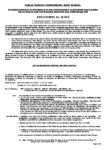Fact Box: Nagaland extends Inner Line Permit regime to Dimapur district

The state government of Nagaland has extended Inner Line Permit (ILP) regime to Dimapur district, which is the commercial hub of the state. Dimapur was the only district that was not under ILP regime unlike the rest of Nagaland, which came into being in 1963. The ILP regime was also extended to neighbouring Manipur with President Ram Nath Kovind signing the order in this effect.
Key Highlights
The Inner Line permit was extended by the Governor of Nagaland in exercise of powers conferred under Section 2 of Bengal Eastern Frontier Regulation, 1873. Earlier, on 15 February, state Cabinet had approved the proposal to extend ILP to Dimapur.
As per the notification: All non-indigenous people who have entered district after 21 November 1979, will have to obtain ILP within 90 days from 9 December 2019. However, those who have settled or have entered before 21 November 1979, and have been staying continuously, will be exempted from the ILP regime, along with his/her direct descendants.
Also, the Non-indigenous persons living in Dimapur prior to 21 November 1979, will have to produce documents to deputy commissioner for exemption. Any non-indigenous person passing through district as a transit passenger and having a valid ticket will not be required to obtain ILP.
What is ILP regime?
The main aim of ILP system is to prevent settlement of other Indian nationals in these states to protect indigenous population. Thus to visit an ILP-regime states, the outsiders, including people from other states of country, need to take permission. There are also protections for locals with regards to lands, jobs and other facilities. As of now, besides Nagaland and Manipur, the ILP regime is also applicable to Arunachal Pradesh and Mizoram.
ILP regime is applicable under Bengal Eastern Frontier Regulation, 1873, and under Section 2 of this regulation, citizens of other states require ILP for visiting these states.
What is the sudden need for ILP?
With passing of Citizenship (Ammendment) Bill by parliament, there have been widespread protests in Northeast against it. According to the act, members of Hindu, Buddhist, Jain, Sikh, Parsi and Christian communities, who have come from Bangladesh, Pakistan, and Afghanistan, till 31 December 2014, facing religious persecution there, will not be treated as illegal immigrants but given Indian citizenship. Union Home Minister Amit Shah had also announced that proposed law will not be applicable to ILP regime states and areas governed under 6th Schedule of Constitution.
Note: Under 6th Schedule of Constitution, autonomous councils and districts were created in certain tribal areas in Assam, Tripura and Meghalaya. The autonomous councils and districts enjoy some executive and legislative powers.



